

Countryside officer Job Information. Page Content Countryside officer Hours37 per weekStarting salary£18,000 + per year As a countryside officer you would be involved in the management, protection and improvement of the rural environment.

If you are passionate about the countryside and keeping it safe for future generations, this job could suit you. In this job you will need to be confident and assertive. Many countryside officers have a relevant HND, foundation degree or degree. WorkDesc. Ecologist job profile. If you enjoy working with data and are interested in the environment, a career as an ecologist may be for you Ecologists are concerned with ecosystems as a whole, the abundance and distribution of organisms (people, plants, animals), and the relationships between organisms and their environment.

They usually specialise in a particular area, such as freshwater, marine, terrestrial, fauna or flora and carry out a range of tasks relating to that area. When starting out, ecologists often conduct surveys to identify, record, and monitor species and their habitats. Ecologist job information. Page Content Ecologist Hours37-40 per weekStarting salary£17,000 + per year Ecologists study the relationship between plants, animals and their environment.

The aim of their work could range from balancing the needs of the environment to coming up with ideas for land management. Marine scientist job profile. Marine scientists are involved in research, analysis and forecasts in relation to the oceans, their life forms and coastal areas.

They analyse the sea and its interaction with the land, atmosphere and sea floors and use the information gained to predict changes to the earth's infrastructure, inform statutory legislation and encourage environmental protection. Marine science is a broad-ranging field that covers subjects as diverse as: Marine scientist: job description. What does a marine scientist do?
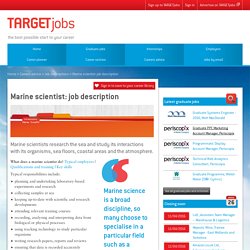
Typical employers | Qualifications and training | Key skills Typical responsibilities include: planning and undertaking laboratory-based experiments and research collecting samples at sea keeping up-to-date with scientific and research developments attending relevant training courses recording, analysing and interpreting data from biological or physical processes using tracking technology to study particular organisms writing research papers, reports and reviews ensuring that data is recorded accurately using problem-solving skills to develop solutions to research challenges using specialist computer databases and software to analyse and manage data developing and maintaining a network of contacts making presentations identifying new funding sources and applying for grants planning and organising field research trips generating new research hypotheses and research theories testing out theories and hypotheses Typical employers of marine scientists.
Marine Biologist Biology. Marine biologists study marine plants, animals and other organisms, both vertebrate and invertebrate, in deep oceans and shallow seas and in the laboratory.
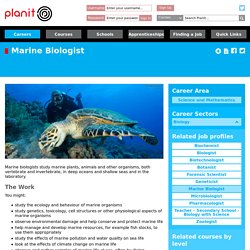
The Work You might: study the ecology and behaviour of marine organisms study genetics, toxicology, cell structures or other physiological aspects of marine organisms observe environmental damage and help conserve and protect marine life help manage and develop marine resources, for example fish stocks, to use them appropriately study the effects of marine pollution and water quality on sea life look at the effects of climate change on marine life observe and gather samples of marine life at sea, often by diving identify and study samples, and analyse data, in a laboratory write reports and make recommendations based on your research. Pay The figures below are only a guide.
Nature conservation officer job profile. If you are passionate about the environment and want to encourage others to enjoy and protect it, this may be the job for you… As a nature conservation officer you'll work to protect, manage and enhance the local environment.

This can include grassland, woodland, forests, coastal areas, moorland, mountains and rivers. Depending on the region, you might also work in marine habitats. Nature conservation officer: job description. What does a Nature conservation officer do?
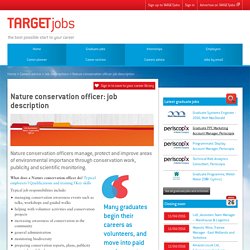
Typical employers | Qualifications and training | Key skills Typical job responsibilities include: managing conservation awareness events such as talks, workshops and guided walks helping with volunteer activities and conservation projects increasing awareness of conservation in the community general administration monitoring biodiversity preparing conservation reports, plans, publicity materials and displays fieldwork general maintenance projects developing visitor attractions wildlife observation species surveys Working with the public is a key feature of the job. Typical employers of conservation officers Charities The National Trust Local authorities Utilities Wildlife trusts Government organisations Conservation groups such as The British Trust for Conservation Volunteers.
Water conservation officer: job description. What does a water conservation officer do?
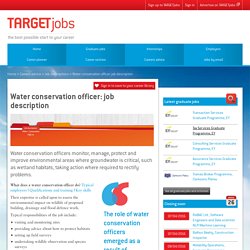
Typical employers | Qualifications and training | Key skills Their expertise is called upon to assess the environmental impact on wildlife of proposed building, drainage and flood defence work. Typical responsibilities of the job include:
Courses/Training. Conservation Officer - Lantra Careers. Other information about this role Also known as Nature Conservation Officer, Biodiversity Officer, Countryside Officer, Ranger.
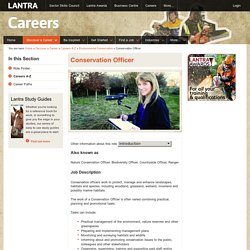
Job Description Conservation officers work to protect, manage and enhance landscapes, habitats and species, including woodland, grassland, wetland, moorland and possibly marine habitats. Environmental Conservation - Lantra Careers. Environmental conservation is the practice of protecting our natural habitat for the benefit of the environment and its inhabitants. It is concerned with the conservation of landscapes, species and their habitats; and the management of public access. The environmental conservation industry is diverse and attracts a variety of people into an array of different careers. Those employed within this industry may work on creating public access to the countryside whilst others will be actively rebuilding natural habitats or dry stone walls.
Career Paths - Lantra Careers. Naturenet: Get a job working in the countryside industry. Get a job working in the countryside industry Naturenet shows you how. o, you want to work in countryside management? Naturenet spills the beans on how to succeed in your quest. Careers Advice · Students & Careers · CIEEM - Chartered Institute of Ecology and Environmental Management. So, what makes an ecologist or environmental manager? Careers flyer. Top 10 tips for getting a career in ecology. Join. Dec13. Acorn Ecology Ltd. AECB Home - AECB - The sustainable building association. Environmental Management Consultancy - Business Eco - Home Page.
Carbon Trust independent experts on carbon reduction & sustainability. Centre for Ecology&Hydrology Home. Centre for Sustainable Energy. CIEEM - Chartered Institute of Ecology and Environmental Management. Home. Countryside Management Association. CMA Countryside Management Association. The Crown Estate. Mainstreaming sustainable development: government progress 2013. Sustainable development requires consideration of the economic, environmental and social factors in decision making to deliver the right policies now and enable others to do the same in the future. Defra has published this report on behalf of the government to provide an overview of what has been achieved so far in the move towards mainstreaming sustainable development. The report will be of interest to those with a concern for sustainability in government, but also more widely. It is intended to facilitate scrutiny of our progress to date. The government continues to move towards fully embedding sustainable development in its policies and operations and solid foundations have been put in place to enable further improvement in this area.
Environment, carbon and sustainability. Engineers Without Borders UK. R5 ConservationOrgAfrica Alphabetical. R5ConservationAsia Alphabetical. R5ConservationOrgAmericas Alphabetical. R5ConservationOrgBritish Isles Alphabetical. R5ConservationOrgEurope Alphabetical. R5ConservationOrgOceania Alphabetical. R5ConservationOrgWorld Areas General Category Index. ENDS. Field Studies Council (FSC) - FSC. Forestry Commission homepage. Friends of the Earth. Welcome to the Graduate School of the Environment. The Green Directory UK Natural, organic, ethical, fair trade and environmentally friendly products. Green Guide Directory Introduction. Orchard Café The Green Guide is much more than a consumer or business directory.
Greenpeace Canada. International Union for Conservation of Nature - IUCN. JNCC - Adviser to Government on Nature Conservation. Lantra - Lantra – Agricultural Jobs. LUTube: Sustainability Leaders videocast series. Marine Management Organisation. Home - National Trust. Naturenet - Countryside Management & Nature Conservation. Naturenet - Countryside Management & Nature Conservation.
Planning consultants – applications service – permission and appeals. Rainforest Alliance. Ramsar Convention. The Convention on Wetlands of International Importance, called the Ramsar Convention, is an intergovernmental treaty that provides the framework for national action and international cooperation for the conservation and wise use of wetlands and their resources.
The Ramsar Convention is the only global environmental treaty that deals with a particular ecosystem. The treaty was adopted in the Iranian city of Ramsar in 1971 and the Convention's member countries cover all geographic regions of the planet. The Ramsar mission The Convention's mission is "the conservation and wise use of all wetlands through local and national actions and international cooperation, as a contribution towards achieving sustainable development throughout the world". The Wise Use concept At the centre of the Ramsar philosophy is the “wise use” concept. The Renewable Energy Centre. Renewable Energy Focus - Solar, wind, wave and hydro power news, jobs, events and more. Promoting ethical science, design and technology. Scottish Natural Heritage - Home. Home. News for career advisors. Environment roles are rapidly emerging and evolving as organisations move from greening their operations to greening the whole organisation, offering a wealth of opportunities for those with a passion about creating a sustainable future.
But what steps should you take to move into an environmental practitioner role? 1. Assess Your Skills: Look at your existing skills, are they transferable to a new role? The best way to do that is by using the IEMA Environmental Skills Map (www.iema.net/skills). Then research the wide range of roles that are available to make sure you can plan your training and development effectively that will enable you to enhance your existing skill set.2. UNA Exchange - Volunteer abroad and in Wales. Environment and countryside. Home. Science connecting land and people.